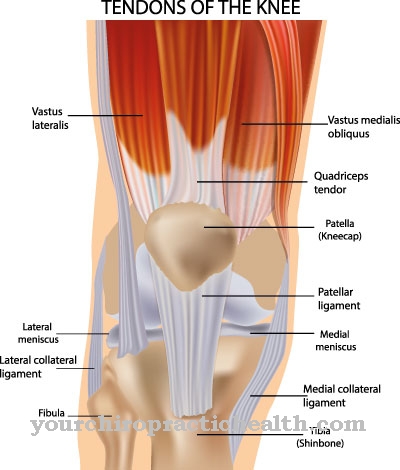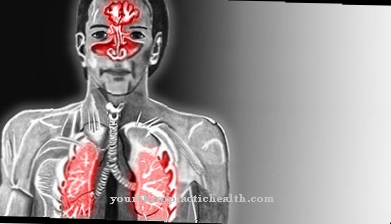Around 5 to 21 percent of the population suffers from it Aphthous ulcers (colloquially also: Canker sores, Aften), a painful inflammation in the mouth. The resulting small vesicles can occur once, from or chronically. If several aphthae appear at the same time, or if they appear more than four times a year, one can Aphtosis be spoken (is usually the case). Children can be affected just as much as adults, and gender is also irrelevant.
What are aphthae?

An aphtha is defined as damage to the oral mucosa in the area of the gums, palate, oral cavity, tongue, or tonsils.
There is a painful, inflamed area (3-4mm on average) in the mouth. In concrete terms, it is a vesicle, which over time develops into a small, yellowish depression and is surrounded by a red, inflammatory edge.
A distinction is made between two types of aphthae: on the one hand, the “common” aphtha, which occurs briefly and, on the other hand, the “recurrent”, i.e. the recurring inflammation of the mucous membrane in the mouth.
causes
The causes of the aphthae are currently not clearly understood. On the one hand, bacteria and viruses are possible triggers. It is also known that Behcet's disease (an inflammation of the blood vessels) can be held responsible for the occurrence of aphthae. On the other hand, it is assumed that the vesicles can be caused by certain foods that are incompatible with the body (e.g. preservatives, colorings, etc.), or that food deficiencies, such as an existing iron deficiency, could be the cause.
The psychological well-being of the individual also plays a role, as is the case with many other diseases. Certain ingredients, such as those found in toothpaste, are being discussed as triggers by science.
Another possible cause is an autoimmune reaction of the body. Here your own immune system fights the tissue of your own body. Doctors assume that this disease is not contagious and therefore non-communicable. In summary, it can be said that a multifactorial development is most likely hidden behind this disease.
Symptoms, ailments & signs
Aphthae usually occur on the mouth or in the genital area and are usually circular or oval. They initially cause abnormal sensations such as burning or a feeling of tension in the affected area. After about 24 hours a reddening occurs and a kind of mucosal defect with a yellow or gray-white coating forms. The aphtha itself is inflammatory red and surrounded by a bright red halo.
Apthens can occur in different places, for example on the mucous membrane of the oral cavity, on the tongue, on the gums or on the roof of the mouth. Occasionally, the noticeable redness is localized on the mucous membrane in the genital area. The size of the aphthae can be very different - from the size of a pin head to a diameter of up to two three centimeters. Depending on their type, aphthae can be very different in their appearance.
The minor type is characterized by isolated mucosal defects in the mouth or in the genital area, which are usually three to five millimeters in size and heal again after five to seven days. With the major type, there are deeper skin changes that can be up to three centimeters in size. Those affected usually feel sick and also suffer from swollen lymph nodes or fever. Aphthous ulcers of the herpetiform type are very small and painful and usually spread over the entire oral cavity.
Diagnosis & course
To diagnose the aphthous ulcers, the doctor examines the patient by taking a look in his mouth and having his symptoms described. In rare cases, a blood test is ordered to rule out other diseases. The first signs are usually the smallest inflammations in the oral cavity, which are barely noticeable to the naked eye, but often lead to pain in the patient.
The often very small whitish to yellowish-looking vesicles form within a few hours. Within a very short time, round or oval depressions appear in the oral mucosa, the edges of which are slightly raised and very red.
Regarding the course of the disease, it should be noted that the aphthae usually disappear again after one to two weeks, but healing depends on the size (with larger aphthae the healing process can take up to four weeks).
Complications
In most cases, aphthae do not lead to further complications. They usually stay on the lips for around two weeks and disappear on their own if there is no further inflammation in the respective area. The pain can severely limit the patient's quality of life.
As a result, normal food and fluid intake is no longer possible. The aphthae can also lead to stress in everyday life and to headaches and nausea due to the reduced fluid intake. The treatment is usually done with ointments or solutions and also quickly leads to success.
Complications usually do not occur if the aphthae are treated in good time by a doctor. However, the affected areas should not be touched by the patient. The aphthae often cause small bleeding, so that the mouth could taste unpleasantly like blood and could hurt.
The canker sores are hardly noticeable on the outside, but can lead to complications with the partner, as kissing is no longer possible. After a few weeks, however, the aphthae disappear on their own and do not lead to any further problems or consequential damage.
When should you see a doctor?
In most cases, aphthae are harmless to health and heal on their own without further treatment. A visit to the doctor is recommended if the damage does not subside after one to three weeks at the latest or is associated with particularly unpleasant accompanying symptoms. If there is pain, itching or bleeding in the mouth in addition to the aphthous ulcers, a doctor should be consulted immediately. The same applies to particularly large damage, which may even be associated with inflammation.
Aphthous ulcers that recur should also be medically clarified. Children who suffer from inflammatory skin changes should see a pediatrician after a week at the latest. If the affected child no longer wants to drink or eat because of the pain, it is advisable to see a doctor immediately. People with previous illnesses of chronic periodontitis or inflammation of the oral mucosa should go to the doctor as soon as possible with the symptoms. Likewise pain patients, pregnant women and other risk groups if the aphthae do not go away after a few days or if further physical complaints are added.
Doctors & therapists in your area
Treatment & Therapy
There are a number of options for treating aphthae. In general, the treating doctor usually uses pain relievers such as lidocine in the form of gargle solutions, ointments or sprays.
Corrosive agents such as rhubarb root extract or silver nitrate can also be used. The corrosive effect is said to accelerate the healing process by shedding dead tissue. If an infectious cause can be ruled out, triamcinolone acetonide, in the form of an ointment, is often prescribed.
It is popular saying that using home remedies such as tea tree oil and chamomile and sage tea rinses will help. Studies have shown that avoiding sodium lauryl sulfate (found in toothpaste) resulted in a significant reduction in aphthous ulcers. So-called soft lasers are also being discussed for the treatment of aphthae, which fight inflammation, alleviate pain and heal the tissue.
Outlook & forecast
The small inflammatory areas in the mouth heal completely with or without treatment. The healing time for individual aphthae is one to two weeks. This depends on whether they are receiving medical care and what foods the sick person is consuming.
The healing process slows down when the consumption of acidic nutrients damages the protective layer over the affected area. Likewise, careless oral hygiene or stretching of the skin can cause cracks, which lead to a prolonged healing process. Playing with the tongue in the affected area also leads to longer-lasting symptoms.
Although the individual aphthae heal completely within a few weeks, there is a risk that aphthae will recur in the course of life. There is no lifelong freedom from symptoms. The triggering germs can attack the mucous membranes in the mouth again at any time and lead to inflammation.
If you have a weakened immune system or other illnesses, the likelihood that aphthae will form more often increases. If the patient also suffers from a chronic underlying disease, the painful inflammations occur more frequently than normal. The diseases include in particular Crohn's disease or rheumatism. In addition, a lack of vitamin B12 or iron is conducive to the development of aphthae.
prevention
To prevent aphthous ulcers, the avoidance of incompatible foods, the reduction of stress, an adequate supply of vitamins, adequate oral hygiene and the use of a brine toothpaste are recommended.
Aftercare
In most cases, aphthae go away on their own without complications. As a rule, no special follow-up measures are necessary. However, this depends a lot on the cause and size of the aphthous ulcers. In general, those affected should ensure conscientious oral hygiene and dental care. You should avoid dental care products containing sodium lauryl sulfate, as these irritate the oral mucosa and thus hinder healing.
Special mouthwashes with tea tree oil can help accelerate wound healing and prevent aphthae from recurring. This is particularly recommended for frequently recurring aphthae. Alcohol, strongly carbonated drinks and spicy and spicy foods should be avoided for a few days, especially in the case of large and painful aphthae. For some people, the development of aphthae is associated with certain foods containing histamine.
In such cases, it is advisable to consume the corresponding foods in moderation for a few weeks. If it is suspected that nutritional deficiencies or nutritional deficiencies are the cause of the disease, they should continue to be treated. Otherwise new aphthae can develop. In the case of particularly large aphthae or in the genital and anus areas, scars can remain. In these cases the wound should be examined by a doctor.
↳ More information: Home remedies for aphthae
You can do that yourself
The damage to the mucous membrane caused by aphthae and the accompanying pain can possibly be alleviated with tried and tested home remedies. A high vitamin C supply is always recommended so that the immune system is strengthened. Vitamin C powders with a high bioavailability are very suitable. Those affected should also consume zinc, which is also effective against infections and strengthens the immune system.
Aloe vera has a pain-relieving effect, promotes healing and promotes the supply of fluid to the mucous membrane. The naturally pure and already pressed gel is applied to the aphthous ulcers several times a day. Rinsing with baking soda, which has been dissolved in water, can kill the causative germs and thus help the inflammation to heal more quickly. Manuka honey with a high MGO value often helps against aphthae due to its strong antiseptic effect.
The effect of dry coriander seeds, which have to simmer gently for five minutes in 250 ml of boiling water, is also impressive. The seeds are then left to steep for 10 minutes. Now strain through, let cool and rinse your mouth several times a day with the brew. Sea salt, in combination with 3 percent hydrogen peroxide for severe aphthous ulcers, has a high antiseptic and anti-inflammatory effect. Pour this mix into lukewarm water and rinse your mouth out several times a day.
The family doctor should be consulted immediately if, for example, there is no improvement or the aphthous ulcers come back.





.jpg)







.jpg)

.jpg)
.jpg)











.jpg)